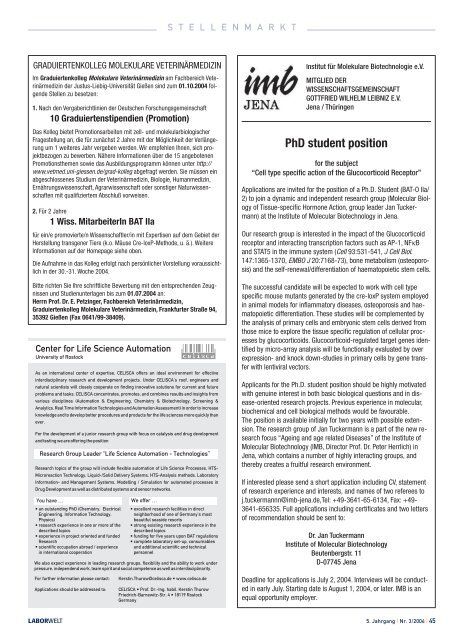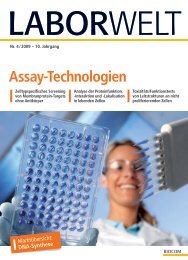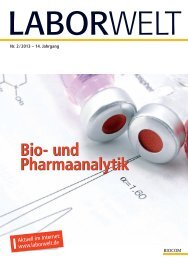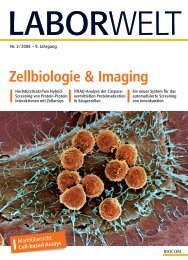PDF Download - Laborwelt
PDF Download - Laborwelt
PDF Download - Laborwelt
Sie wollen auch ein ePaper? Erhöhen Sie die Reichweite Ihrer Titel.
YUMPU macht aus Druck-PDFs automatisch weboptimierte ePaper, die Google liebt.
S T E L L E N M A R K T<br />
GRADUIERTENKOLLEG MOLEKULARE VETERINÄRMEDIZIN<br />
Im Graduiertenkolleg Molekulare Veterinärmedizin am Fachbereich Veterinärmedizin<br />
der Justus-Liebig-Universität Gießen sind zum 01.10.2004 folgende<br />
Stellen zu besetzen:<br />
1. Nach den Vergaberichtlinien der Deutschen Forschungsgemeinschaft<br />
10 Graduiertenstipendien (Promotion)<br />
Das Kolleg bietet Promotionsarbeiten mit zell- und molekularbiologischer<br />
Fragestellung an, die für zunächst 2 Jahre mit der Möglichkeit der Verlängerung<br />
um 1 weiteres Jahr vergeben werden. Wir empfehlen Ihnen, sich projektbezogen<br />
zu bewerben. Nähere Informationen über die 15 angebotenen<br />
Promotionsthemen sowie das Ausbildungsprogramm können unter http://<br />
www.vetmed.uni-giessen.de/grad-kolleg abgefragt werden. Sie müssen ein<br />
abgeschlossenes Studium der Veterinärmedizin, Biologie, Humanmedizin,<br />
Ernährungswissenschaft, Agrarwissenschaft oder sonstiger Naturwissenschaften<br />
mit qualifiziertem Abschluß vorweisen.<br />
2. Für 2 Jahre<br />
1 Wiss. MitarbeiterIn BAT IIa<br />
für ein/e promovierte/n Wissenschaftler/in mit Expertisen auf dem Gebiet der<br />
Herstellung transgener Tiere (k.o. Mäuse Cre-loxP-Methode, u. ä.). Weitere<br />
Informationen auf der Homepage siehe oben.<br />
Die Aufnahme in das Kolleg erfolgt nach persönlicher Vorstellung voraussichtlich<br />
in der 30.-31. Woche 2004.<br />
Bitte richten Sie Ihre schriftliche Bewerbung mit den entsprechenden Zeugnissen<br />
und Studienunterlagen bis zum 01.07.2004 an:<br />
Herrn Prof. Dr. E. Petzinger, Fachbereich Veterinärmedizin,<br />
Graduiertenkolleg Molekulare Veterinärmedizin, Frankfurter Straße 94,<br />
35392 Gießen (Fax 0641/99-38409).<br />
Center for Life Science Automation<br />
University of Rostock<br />
As an international center of expertise, CELISCA offers an ideal environment for effective<br />
interdisciplinary research and development projects. Under CELISCA's roof, engineers and<br />
natural scientists will closely cooperate on finding innovative solutions for current and future<br />
problems and tasks. CELISCA concentrates, promotes, and combines results and insights from<br />
various disciplines (Automation & Engineering, Chemistry & Biotechnology, Screening &<br />
Analytics, Real Time Information Technologies and Automation Assessment) in order to increase<br />
knowledge and to develop better procedures and products for the life sciences more quickly than<br />
ever.<br />
For the development of a junior research group with focus on catalysis and drug development<br />
and testing we are offering the position<br />
Research Group Leader “Life Science Automation - Technologies”<br />
Research topics of the group will include flexible automation of Life Science Processes, HTS-<br />
Microreaction Technology, Liquid-/Solid Delivery Systems, HTS-Analysis methods, Laboratory<br />
Information- and Management Systems, Modelling / Simulation for automated processes in<br />
Drug Development as well as distributed systems and sensor networks.<br />
You have …<br />
• an outstanding PhD (Chemistry, Electrical<br />
Engineering, Information Technology,<br />
Physics)<br />
• research experience in one or more of the<br />
described topics<br />
• experience in project oriented and funded<br />
Research<br />
• scientific occupation abroad / experience<br />
in international cooperation<br />
We offer …<br />
• excellent research facilities in direct<br />
neighborhood of one of Germany’s most<br />
beautiful seaside resorts<br />
• strong existing research experience in the<br />
described topics<br />
• funding for five years upon BAT regulations<br />
• complete laboratory set-up, consumables<br />
and additional scientific and technical<br />
personnel<br />
We also expect experience in leading research groups, flexibility and the ability to work under<br />
pressure, independend work, team spirit and social competence as well as interdisciplinarity.<br />
For further information please contact: Kerstin.Thurow@celisca.de • www.celisca.de<br />
Applications should be addressed to: CELISCA • Prof. Dr.-Ing. habil. Kerstin Thurow<br />
Friedrich-Barnewitz-Str. 4 • 18119 Rostock<br />
Germany<br />
Institut für Molekulare Biotechnologie e.V.<br />
MITGLIED DER<br />
WISSENSCHAFTSGEMEINSCHAFT<br />
GOTTFRIED WILHELM LEIBNIZ E.V.<br />
Jena / Thüringen<br />
PhD student position<br />
for the subject<br />
“Cell type specific action of the Glucocorticoid Receptor”<br />
Applications are invited for the position of a Ph.D. Student (BAT-O IIa/<br />
2) to join a dynamic and independent research group (Molecular Biology<br />
of Tissue-specific Hormone Action, group leader Jan Tuckermann)<br />
at the Institute of Molecular Biotechnology in Jena.<br />
Our research group is interested in the impact of the Glucocorticoid<br />
receptor and interacting transcription factors such as AP-1, NFκB<br />
and STAT5 in the immune system (Cell 93:531-541, J Cell Biol.<br />
147:1365-1370, EMBO J 20:7168-73), bone metabolism (osteoporosis)<br />
and the self-renewal/differentiation of haematopoietic stem cells.<br />
The successful candidate will be expected to work with cell type<br />
specific mouse mutants generated by the cre-loxP system employed<br />
in animal models for inflammatory diseases, osteoporosis and haematopoietic<br />
differentiation. These studies will be complemented by<br />
the analysis of primary cells and embryonic stem cells derived from<br />
those mice to explore the tissue specific regulation of cellular processes<br />
by glucocorticoids. Glucocorticoid-regulated target genes identified<br />
by micro-array analysis will be functionally evaluated by over<br />
expression- and knock down-studies in primary cells by gene transfer<br />
with lentiviral vectors.<br />
Applicants for the Ph.D. student position should be highly motivated<br />
with genuine interest in both basic biological questions and in disease-oriented<br />
research projects. Previous experience in molecular,<br />
biochemical and cell biological methods would be favourable.<br />
The position is available initially for two years with possible extension.<br />
The research group of Jan Tuckermann is a part of the new research<br />
focus “Ageing and age related Diseases” of the Institute of<br />
Molecular Biotechnology (IMB, Director Prof. Dr. Peter Herrlich) in<br />
Jena, which contains a number of highly interacting groups, and<br />
thereby creates a fruitful research environment.<br />
If interested please send a short application including CV, statement<br />
of research experience and interests, and names of two referees to<br />
j.tuckermannn@imb-jena.de,Tel: +49-3641-65-6134, Fax: +49-<br />
3641-656335. Full applications including certificates and two letters<br />
of recommendation should be sent to:<br />
Dr. Jan Tuckermann<br />
Institute of Molecular Biotechnology<br />
Beutenbergstr. 11<br />
D-07745 Jena<br />
Deadline for applications is July 2, 2004. Interviews will be conducted<br />
in early July. Starting date is August 1, 2004, or later. IMB is an<br />
equal opportunity employer.<br />
LABORWELT 5. Jahrgang | Nr. 3/2004 | 45
















